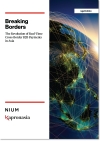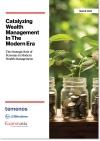Latest Insight
- Why cash is still prevalent in Asia
- Japan steps up green finance efforts
- South Korea charts middle path on crypto
- Should Grab and GoTo merge?
- Singapore pushes ahead with fintech-driven sustainability
- Digital banks in South Korea continue to thrive
- Billease is the rare profitable BNPL firm
- Fintech sector in Pakistan faces mounting challenges
- Where digital banks in Asia can make a difference
- Cashless payments jump in Vietnam
Latest Reports
-
Breaking Borders
 Despite progress in payment systems, the absence of a unified, cross-border Real-Time Payments (RTP) network means that intermediaries play a crucial role in facilitating connectivity. This report examines the ongoing complexities, challenges, and initiatives in creating a seamless payment landscape across Asia. Innovate to Elevate
Despite progress in payment systems, the absence of a unified, cross-border Real-Time Payments (RTP) network means that intermediaries play a crucial role in facilitating connectivity. This report examines the ongoing complexities, challenges, and initiatives in creating a seamless payment landscape across Asia. Innovate to Elevate In the dynamic and diverse financial landscape of the Asia-Pacific (APAC) region, banks are at a pivotal juncture, facing the twin imperatives of innovation and resilience to meet evolving consumer expectations and navigate digital disruption. Catalyzing Wealth Management In The Modern Era
In the dynamic and diverse financial landscape of the Asia-Pacific (APAC) region, banks are at a pivotal juncture, facing the twin imperatives of innovation and resilience to meet evolving consumer expectations and navigate digital disruption. Catalyzing Wealth Management In The Modern Era Hyper-personalized wealth management presents a paradigm shift from traditional models relying on static, generalized segments. Developing tailored investor personas based on psychographics, behaviours and fluid financial goals enables financial institutions to deliver rich and tailored customer experiences that resonate with next-generation priorities.
Hyper-personalized wealth management presents a paradigm shift from traditional models relying on static, generalized segments. Developing tailored investor personas based on psychographics, behaviours and fluid financial goals enables financial institutions to deliver rich and tailored customer experiences that resonate with next-generation priorities.
Events
| April 23, 2024 - April 25, 2024 Money 2020 Asia 2024 |
| October 21, 2024 - October 24, 2024 Sibos Beijing |
| November 06, 2024 - November 08, 2024 Singapore Fintech Festival |
WhatsApp has something most other would-be super apps do not: the stickiness of an immensely popular messaging service. And unlike China's WeChat, WhatsApp is a global phenomenon, with large user bases in a diverse array of countries: India, Indonesia, Brazil, South Africa and the United States to name a few. Having eschewed advertising, WhatsApp hopes to monetize all those users with digibanking and e-commerce services. If WhatsApp becomes a global one-stop shop for communication, shopping and banking it will be the only app of its kind.
Not so long ago, Ant Group looked set to build a digital finance empire in Asia. Ant has a foothold, in one form or another, in every major Asian economy. The company has invested in e-wallets across Southeast Asia. It operates fledgling digital banks in Hong Kong and Singapore, the region's two key financial hubs. It is a major backer of India's largest fintech unicorn, Paytm. Ant even has fintech investments in Bangladesh and Pakistan. Yet in retrospect Ant may have overextended itself internationally, confident that its ascent was insuperable even as regulatory problems mounted at home.
December was an eventful month for Australia's neobanks. Xinja's demise made waves, showing that it does not pay to keep building atop a flimsy foundation. Castles in the air must come down. And yet, some Aussie neobanks are thriving. Shortly after Xinja said it would turn in its banking license, Australian Financial Review reported that Judo Bank was set to raise up to AU$200 million from investors, bringing its valuation to AU$1.65 billion.
Afterpay has to be feeling pretty good heading into 2021. It has become one of the largest buy now, pay later (BNPL) firms in the world and is growing fast just as the sector hits its stride. BNPL is not a new idea, but Afterpay has repackaged it neatly: four interest-free installments with no fees at all for customers as long as they pay on time. Retailers are willing to take on the risk of late or missed payments because Afterpay is bringing in more business for them. The company's sales grew 112% year-on-year in November to a record US$2.1 billion. Its share prices have risen roughly 270% to A$113.29 from A$30.63 when the year began.
The Grab-Gojek rivalry is fast becoming the stuff of legend. Barring a merger, those two Southeast Asian decacorns are determined to one-up each other for evermore. The rivalry began with ride hailing and food delivery and has intensified in the fintech sector, the best hope for both firms to reach profitability and provide their deep-pocketed investors with an attractive exit. Following Grab leading a US$100 million funding round in Indonesian e-wallet LinkAja, Gojek spent US$160 million to increase its stake in PT Bank Jago to 22% from 4%. It is Gojek's largest investment yet in financial services.
Taiwan has had no shortage of opportunities to become a regional financial center. Most recently, Hong Kong's business environment declined markedly, prompting calls in Taipei to attract financial business from the former British colony. That will not happen though. Taiwan's regulatory environment is too restrictive. The business that leaves Hong Kong will instead go to Singapore and Tokyo.
In the twilight of 2020, warnings about shaky neobank business models often fall on deaf ears. For most neobanks and their investors, the prevailing business model remains growth first, ask questions later. Perhaps the abrupt collapse of Xinja, an erstwhile high-flying Australian neobank, will give others in the sector pause about their approach. Like most of its peers, Xinja telegraphed extreme confidence about its prospects. Right up until the end, Xinja was cool as a cucumber, assuring the public that a huge investment from Dubai-based investors was on the way. As it turns out, the cash is missing in action. And it is quite a sum.
Political uncertainty has dulled Hong Kong's edge as a global financial center. That much was clear long before Ant Group's IPO came to a screeching halt. The abortive Ant deal signaled that politics could shake Hong Kong's capital markets too. Still, Hong Kong's IPO market remains red hot - just not for fintechs anymore. As Hong Kong draws closer to China, it will assume the role of the country's offshore financial center. That will provide both Singapore and Japan with the chance to win some new business, which will be for the best. Asia is large enough to have multiple financial centers, each with a different role.
South Korea's digital payments market has grown at a brisk clip amid the pandemic. From January to November, contactless payments rose 17% as businesses and consumers shifted to online transactions, according to the Bank of Korea. E-commerce transactions rose 26% during that period. It is against this backdrop that the Korean startup CHAI sees an opportunity for an API that allows online merchants to accept more than 20 payment systems.
Revolut always thinks big, so it is no surprise that the UK neobank unicorn is now billing itself as a global financial super app. Revolut's CEO Nikolay Storonsky spoke about this topic at Singapore's recent Fintech Festival. It was hard not to see the irony there. While Revolut was talking about its super app dreams, Grab-Singtel, Sea Group and Ant Group were mulling how to best use their newly won Singapore digital bank licenses. Revolut was not even in the running for one. It dropped out of the race more than a year ago due to the stringent capitalization requirements.
More...
Now that Singapore's digital banking race is over, the losers must shift gears. And there were far more failed than successful bids. Of the 14 applicants which made it to the final round, only four were awarded licenses. The Monetary Authority of Singapore (MAS) may issue a fifth license in the future, but none of the remaining 10 applicants will sit around waiting for that day. Instead, they will look for opportunities outside of Singapore.
E-commerce is an ideal platform from which to launch a digital payments business. Alibaba figured that out early on, launching Alipay back in 2004. Today, it is hard for any e-wallet to become as dominant as Alipay, especially in a market as competitive as Indonesia. Yet Sea Group's ShopeePay is fast becoming one of Indonesia's most popular e-wallets on the back of Shopee's ascension. Shopee was Indonesia's top e-commerce platform by site visits in 2019 and looks set to repeat that feat this year.
Lufax is one of the few prominent Chinese fintechs that foresaw tighter regulation of online lenders, perhaps because the company began as a peer-to-peer lender. As Beijing in 2017 launched what would become a sustained campaign to eradicate the scandal-ridden P2P lending sector in China, Lufax moved to exit the industry. By 2019, Lufax had transformed from a P2P lender into an online provider of credit facilitation and wealth management services. It is thus no surprise that Lufax is weathering the current microlending crackdown well so far. The company's IPO went off without a hitch in New York, raising US$2.4 billion.
The Monetary of Authority of Singapore (MAS) set the bar high for aspiring digital banks to ensure that the licensees would be well capitalized and have a clear path to profitability. The stringent requirements ensured that defiant upstarts like the UK's Revolut opted out of the competition. In the end, the MAS awarded four licenses, two digital full bank (DFB) and two digital wholesale bank (DWB). There were few surprises. The winners were primarily big platform companies long considered leading candidates. The one exception was the consortium made up of Greenland Financial Holdings, Linklogis Hong Kong and Beijing Co-operative Equity Investment Fund Management, which was awarded a DWB license.
Gojek began more than a decade ago as Indonesia's answer to Uber. It since has evolved into a large platform company with super app ambitions. For Gojek, the key to becoming Indonesia's dominant app lies in mass monetization of its e-wallet services. The trouble is, that's easier said than done. Indonesia has a surplus of e-wallets all trying to cash in on the booming segment. User loyalty is shaky.















